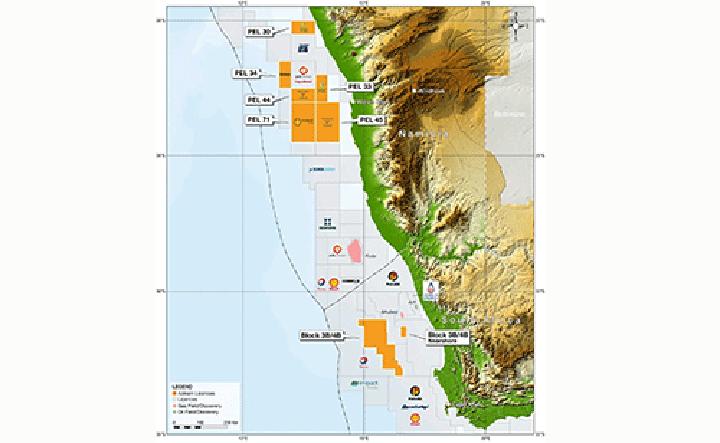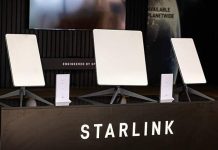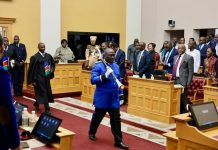Africa-Press – Namibia. Hydrocarbon exploration in Namibia was given a massive boost, with word spreading fast within the industry that Shell’s high impact Graff-1 exploration well offshore Namibia has discovered light oil.
A social media update by Welligence Energy Analytics, a firm focused on the energy sector, confirmed the discovery with a cautionary statement that it is too early to tell if there are commercial quantities of oil.
The Graff-1 well is one of two high profile wells within the Orange Basin, the other being the TotalEnergies Venus-1 well. Success in either or both of these wells could make the Orange Basin one of the hottest exploration destinations in the world.
“It is too early to say whether the well has found commercial quantities – but at the very least, a working petroleum system is likely,” reads the Welligence update.
In the update, the energy analytics firm stated that even though this is a success case, it will greatly encourage other explorers with acreage in the emerging Orange Basin: “Not least TotalEnergies, which is drilling the Venus-1 well in neighbouring Block 2913B (PEL 56). Tullow Oil, Maurel & Prom and Galp are some of the other companies with positions in the basin”.
When contacted for confirmation, petroleum commissioner at the ministry of mines Maggy Shino said the ministry only saw the social media updates on the discovery. She clarified the ministry will give a clear confirmation in the coming weeks.
“We saw the updates, but no official communication came from Shell or Namcor, so we will engage and have a clear communication to the public at the later stage. What I’m aware of is that we are busy with the operations,” she said.
Neither Shell, nor partners Qatar Energy and Namcor Namibia were available for comment; they are yet to release details on Graff-1, but operations and testing is in the process, with more information expected this week on the alleged discovery.
However, Namibia has had its fair share of optimistic claims about oil ‘discoveries’ that turned out to be duds from explorers. The latest is the controversy plagued exploratory drilling by Canadian company ReconAfrica, who in April 2021 claimed it had found a “working petroleum system”.
The company has been bullish in its claims that the ecologically sensitive area they are licensed to explore in could contain up to 31 billion barrels of crude oil.
Energy Minister Tom Alweendo labelled the status quo as a “great period for the people of Namibia”. The apparent oil discovery raised fears of the ecological effects of drilling in the region. Environmentalists have warned that drilling and the company’s methods could disrupt biodiversity.
It came as no surprise when investors in the USA filed a class lawsuit on 25 October against ReconAfrica for running a fraudulent scheme that deceived the public over its oil drilling operations in the two Kavango regions.
According to court papers, the company knew that the public documents and statements issued or disseminated in the name of ReconAfrica were materially false and misleading. They also knew that such statements or documents would be issued or disseminated to the investing public.
The company’s value increased from US$191 million at the start of the year to more than a billion dollars in mid-May. In 2013, Brazil’s HRT Participações em Petróleo SA said finding large quantities of oil in Namibia is only “a matter of time”.
The chief executive of HRT, Milton Franke, said he is confident Namibia would become the latest in a string of major Africa crude producers. However, the initial optimism had to give way to disappointment. The company had to acknowledge soon after their grand announcement that it failed to find commercially viable quantities of oil in the first of three wells off Namibia’s coast.
HRT’s shares plummeted more than 90%. The company’s then geologist founder, Marcio Mello, had earlier told Reuters the closely-watched Namibia prospects may hold about 10 billion barrels of oil, enough to supply all US needs for a year-and-a-half.
Azinam acquisition
Meanwhile, oil and gas exploration company Eco (Atlantic) Oil & Gas on Monday signed a memorandum of understanding (MOU) to expand its footprint offshore South Africa and Namibia by acquiring Azinam Group and its offshore asset portfolio in return for a 16.65% equity stake in the enlarged group on completion of the acquisition.
This deal is expected to be concluded by end of January 2022, and it is also expected to strengthen the group’s strategic partnership with Africa Energy and Africa Oil.
According to Offshore Energy, the completion of the acquisition is subject to any requisite approvals from the government of South Africa and Namibia, and the Canadian-based TSX Venture Exchange.
Offshore Energy added, in the promising Orange Basin, Eco Atlantic will acquire 50% working interest in another exploration area (Block 2B), where Africa Energy Corp and Panoro Energy maintain working interests.
The company will also acquire a material working interest of 20% in additional blocks, allowing Eco to strengthen its ongoing strategic partnership with Africa Oil Corp.
CEO of Eco Atlantic Gil Holzman said the acquisition strengthens Eco’s long-term and strategic position in Namibia: “Giving us 85% and operatorship in four highly prospective blocks, and it gives us added versatility as we look to partner with a major player to help accelerate further exploration activities in the country’s burgeoning energy industry”.
Meanwhile, local-based Nabirm Energy Services CEO Olayinka Arowolo yesterday told New Era the Eco acquisition of the Azinam assets in adjacent blocks and the current drilling campaigns by Shell and TotalEnergies is further demonstrative of the efficacy of the Namibian oil and gas sector, and it will strengthen investment posture in the region.
“We look forward to the results of our 3D CSEM campaign with Norwegian-based EMGS later on this year,” said Arowolo.
For More News And Analysis About Namibia Follow Africa-Press






